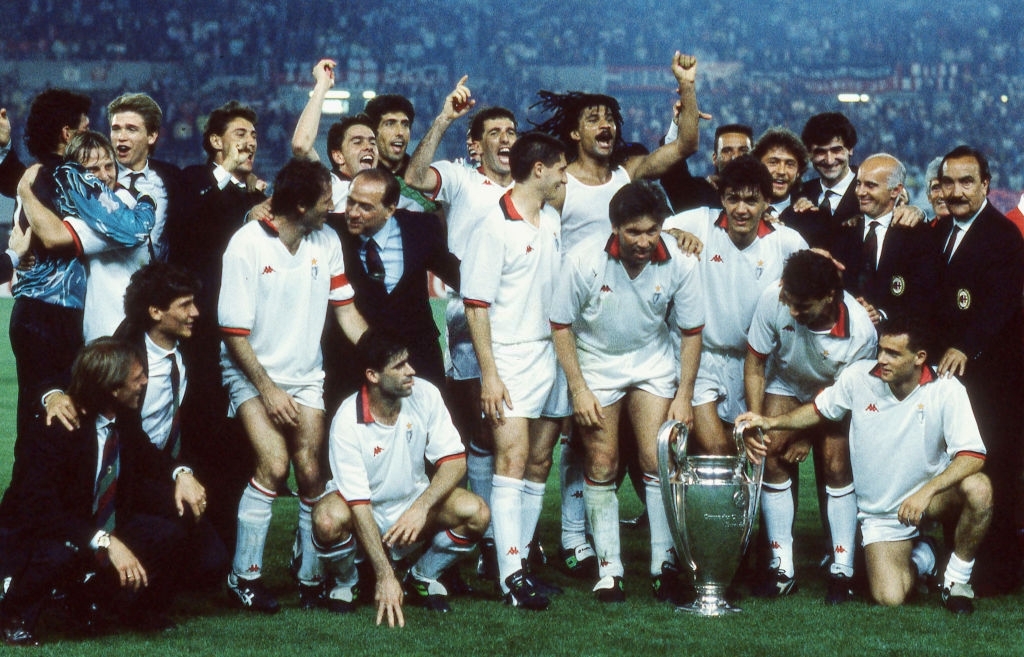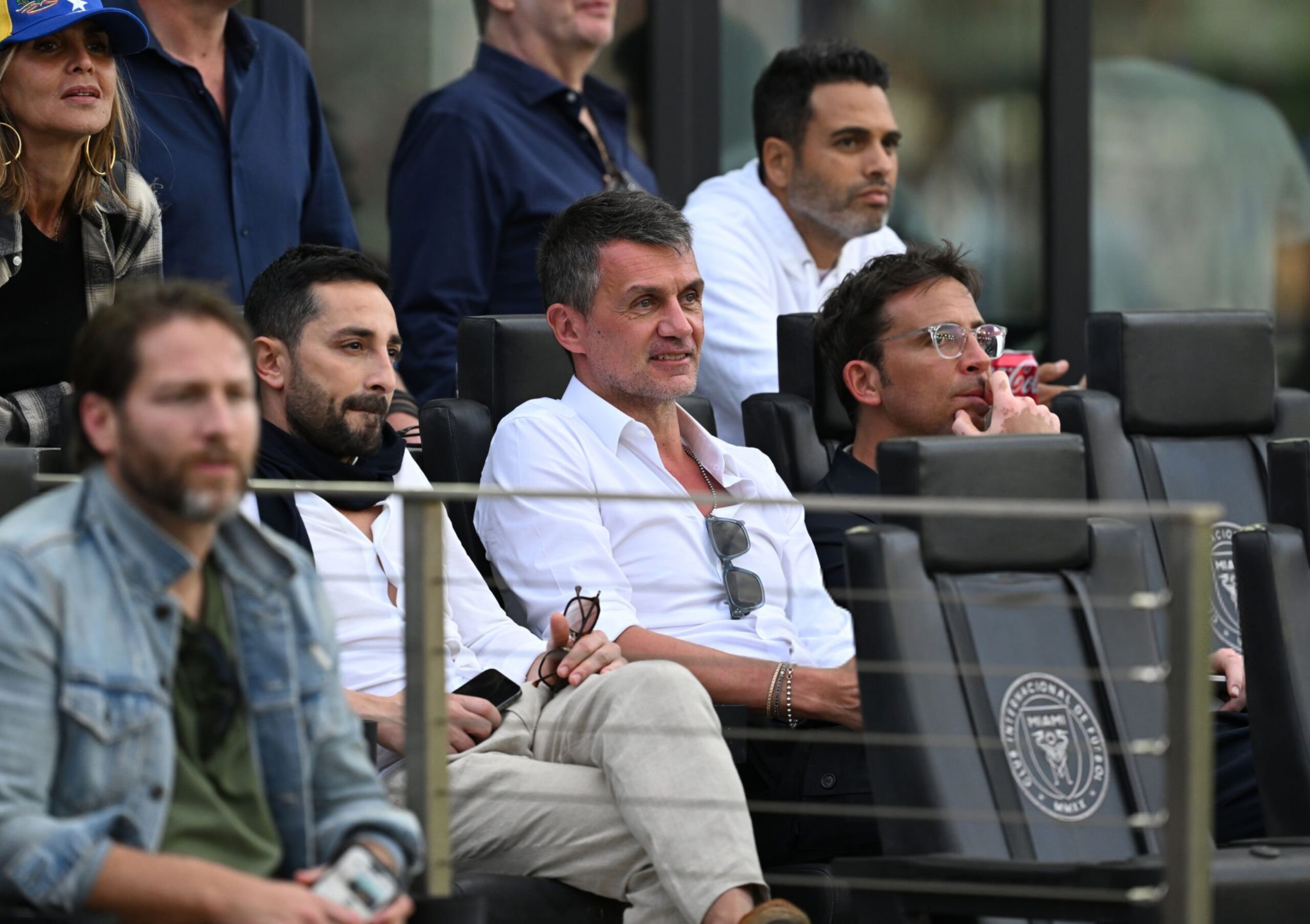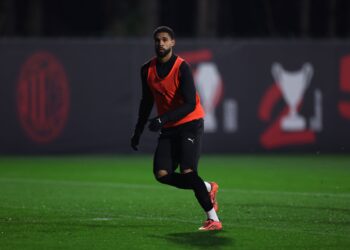Paolo Maldini, Milan icon, former defender and executive, spoke during AKOS, a sports stories podcast. The legendary number 3 discussed his life in Rossoneri colours, covering all the changes the club has undergone. Here are his words as relayed via Radio Rossonera. A career with Milan, through many coaches and two roles, that of a player and an executive.
"I wouldn’t consider it a monotonous journey, but rather one full of ups and downs and satisfactions. I believe that the luck of a player who plays for a team is finding a club that shares your ambitions and has the means to help you reach your highest level. I was fortunate to have not only talent but also a team that aimed for the highest goals: this, I believe, was the number one secret to having such a long career within a club."
He added:
"In the early years, there weren’t many videos; the only way to be broadcast live on Rai, because back then there was Rai, was to play the second half of the selected league game or the Champions League match, which was called the European Cup on Wednesday evenings. You couldn’t know the characteristics of your opponent except through club members who went to watch the matches, but it was all second-hand information. I don’t think there was less professionalism, but there was less knowledge and fewer tools to make the sport more professional, not in terms of commitment but in terms of knowledge."
Maldini continued:
"Especially in certain teams, and Milan was one of these, the youth years were focused on acquiring technical skills, so a lot of technique was emphasized and very little tactics. Then, the development of certain situations encountered on the field. I started playing as a right and left winger, and then around the age of 14, I moved back to being a right-back. In the latter part of my youth career in the Primavera, I played as a right-back. I believe this is still a scheme that works today, although there is a tendency to give more tactical notions to young players who honestly need to develop something else."
Technique and decision-making ability must be improved, says Maldini:
"They need to develop technique and decision-making ability, not to be indoctrinated by coaches who think they are prepared but are far less visionary than the talented boys they coach. Therefore, I would prepare the boys for a different kind of football, not tactical, because tactics always evolve over time. The principles of technique and gameplay, however, will always be relevant. Physical work has also become important, and at a certain point in their growth, preparing boys for competition with men is necessary. From my point of view, it is impossible to change the attitude and especially the mentality of a player when you switch to an adult because you are used to that standard. Changing course is difficult."
The role of Niels Liedholm in his career:
"Fundamental because he was a modern coach, we played with four defenders in line without man-marking back in the 80s, he already thought about players with inverted feet. I am a natural right-footer who adapted to playing on the left, and the ability to cut inside opened up the game for me. His vision and courage to field young players made him a pioneer in football. He always told you to never forget that football is a game, and you have to play to have fun. And it is something that should be repeated to everyone, from the young to the professionals."
On Silvio Berlusconi’s Milan:
"Milanello was built in the 60s, the first center of its kind in the world, and Milan was one of the first teams to believe in such a project: the idea of an enclosed, isolated, and dedicated place was already there. When Berlusconi arrived, he brought a corporate organization that elevated everything and everyone to the highest level, both from a footballing and organizational perspective, and in terms of respecting roles. His first choice, calling a visionary like Sacchi, opened football to other worlds: athletic trainers arrived. Various areas of knowledge came together."
Maldini on Arrigo Sacchi:
"Sacchi made us work very hard physically, and it’s the secret of winning teams: when you work more than others, you have advantages. Since there was less knowledge, I believe I almost always over-trained. I was 20 years old; thinking about it now, we didn’t know the importance of rest, of recovery days: your mind was accustomed to always suffering, but physically you had ups and downs. Often you would arrive on the field without legs: it’s no coincidence we only won one championship in 4 years during the Sacchi era, even though we were focused on European cups. The number of training sessions was the same, but they were longer (2 hours, 2 and a half hours) and the intensity was at its maximum, with two double training sessions a week. Something that is rare now. It was an experiment, based on the principle of hard work, but physically we sometimes didn’t have optimal performances."
Maldini on Franco Baresi:

"Franco retired in 95, and there wasn’t such obsessive attention back then, but Franco was without a doubt a great example for me. I was very reserved, and from my perspective, the way he conducted himself was perfect: few words, many deeds. But so was Mauro Tassotti, with a different character, and so were many players like Evani, Icardi. Let’s say that within those teams, there were very entertaining players with whom you could have fun, and players with a winning mentality: it was up to you to understand which group to follow."
On Marco Van Basten:
"Without injuries, van Basten would have been the greatest striker of all time? Well, he already can be considered that. Beyond the numbers, the fact that he could shoot with both feet, was 1.88 meters tall, fast, and aggressive, he also had this ability to make his technical gestures beautiful. Marco, with what he achieved, practically retired at 28, is to be considered among the top five strikers of all time."
Maldini on the Phenomenon Ronaldo:
"What Ronaldo had, which honestly almost no one else had, or at least when there was a player with that kind of speed and physical impact, they didn’t have Ronaldo’s technique... he honestly managed to do certain things at a speed that no one else had, combining physical control, speed, and strength with a technique that was extraordinary in those 3-4 years."
On his knees, Maldini said:
"I’ve always had some issues with my kneecaps, as did my two sons; I grew a lot one summer, a classic thing you carry with you. In '82-'83 there were few tools… I started doing serious gym work in '98-'99, so at 30 years old, I had never touched the gym before. Until the 2000s, we hardly ever used the gym. We did everything with hills, descents, woods, and jumps. Eventually, understanding improved: at 30, I felt like I was running out of fuel, and when I started going to the gym, my strength exploded in an impressive way. My best years, technically and physically, were in 2002-2003 and 2003-2004. At 35, I could keep up in speed and endurance with any player. When you know that men lose some strength around 30, you need to integrate different kinds of work. That was my issue: playing so many professional years, I had great explosiveness, made strong stops, had a very strong muscle structure, and my traits were those of a sprinter who stops and starts again. This isn't great for the joints. I had operations on my right and left knee two years apart. Back then, they still did microfractures; with new techniques, I might have had fewer post-career problems."
Maldini and changes at Milan:
"I started with Milan when we had two masseurs and one doctor. We had about 15 reusable bandages for ankle issues. I had many ankle problems because of my inward-turning feet and frequent sprains. It was common to get the worst bandage. With Berlusconi, disposable products arrived, more masseurs, more doctors, and other professionals like psychologists and trainers: a group of about 15 people. Now the medical area group has about 30-35 people: 7-8 physiotherapists, some external consultants, 2-3 doctors. It’s not excessive; there’s great attention to the players’ health. Almost every player has a private physiotherapist or doctor, but there must be rules. There must be teamwork; you can't work with a private professional without notifying the head of the medical area. Especially for injury recovery: work can be done outside the facility but must follow the surgeon’s or treating doctor’s instructions."
Maldini on Fabio Capello and Carlo Ancelotti
"If Sacchi was the toughest of all, Capello and Ancelotti were very similar. You always have to consider the different seasons; when you play the Champions League to the end, there’s almost no time to rest. The management of free time changes; giving importance to rest was fundamental, especially in Ancelotti’s era. The secret, in my opinion, is to demand a lot but also give a lot of freedom afterward: free days, the chance to recover. I was often asked what I did during vacations because they give you programs to follow between seasons. I think football is the only sport played for 11 months, sometimes even 11 and a half months. Honestly, I never did anything because my body needed rest. The only season I did something was in 1996 when my son was born, and I had played the European Championship in England. I did 15 days of training and arrived on the first day of camp unable to stand. My great strength was being able to reset everything, think about the vacation, not about the past season or the upcoming one, and achieve a certain level of physical and mental recovery."
Maldini and Differences with the NBA
"There were seasons when I had 5, 7, 8, or 9 days of vacation, practically nothing. It's known that those who had less than 20 days of vacation after a season got injured after a month or a month and a half. Unlike the NBA, where games are always indoors and regular-season games are quite relaxed (the first three quarters are leisurely, then they want to win), playoffs are different. We trained for 5 days, then flew to the United States to play against Real Madrid or Manchester in front of 80,000 spectators and 40 degrees heat. The impact of playing outdoors in winter or summer is huge. There are many differences; the problem is football is increasingly packed with appointments demanding the best spectacle. It’s practically impossible."
Maldini on his role as an executive at Milan:
"When I became an executive, drawing from my 25 years of experience and recalling the many difficult moments I went through, I tried to leverage that experience to support the young players. These young guys often don't yet have the proper structure to handle the pressures that come with this profession. People always see the glamorous side but not the pressure aspect. I believe there's still much work to be done in this area, which remains largely unexplored. Many foreign owners don't fully understand this issue and are reluctant to address it because they lack the tools to do so. We know very well the importance of providing support, even on a moral level, to players before, after, and during training sessions. It's also important to observe how they train to understand whom we are dealing with. I always say these intangible aspects significantly contribute to a club's success. These intangible elements are difficult to explain on an Excel sheet to new owners; they are beyond the control or reach of an owner. It seems like you have a magic formula, but you don't, it's something that made you successful if you had it. Success doesn't just mean winning, it also means trying to do the best you can."
Maldini's anecdotes about Ronaldo and Diego Armando Maradona:
"There are many anecdotes. First of all, when we talk about great players, the two strongest I've ever faced are Ronaldo, the Brazilian, and Maradona for quite similar reasons: technique, speed, goal-scoring ability, the ability to put you in difficulty and disrupt the tactics of the game. When they got the ball, you could be attentive, but once they bypassed two or three players, there was little you could do. Maradona naturally had this ability to lead a people, a team, and a city to something extraordinary, which he did in Naples."
"Like Ronaldo, Maradona was a player who got fouled a lot, probably even more in those years because the 80s were much tougher than the 90s. But he never reacted, never complained beyond the usual, normal gripes. This earned him respect from his opponents. His shooting, technical skills, and physical prowess, he was a real beast physically, made him one of the top three players of all time. He was also funny off the field and on the field, despite the fouls he received, he always managed to crack a joke without losing focus on his goal, which was to win. He was a great lover of the ball, and so was I. Despite all his problems, because he was a guy under a lot of pressure, with many drug problems, and who wasn't helped and was abandoned, his life was very lonely. Such characters often don't trust anyone, have few true friends, and many people around them just to exploit them. This is always the dark side of a high-level athlete's career. Being constantly in the spotlight is something I wouldn't wish on anyone because it has its positives, but someone like Diego couldn't even take a minute of vacation alone, and this sincerely leads to many mechanisms that cause major problems."
Maldini on being famous:
"I am naturally reserved, and I see fame almost as a side effect of my career. After the 1990 World Cup, which was the peak, especially since it was held in Italy, I decided to go on vacation to the United States, and since 1990, I have vacationed in the US. It had become really difficult for me to enjoy those 15 days of peace without talking about football. Football allowed me to travel the world, learn English, see new things, and meet new people. It has been an opportunity, after all. Things don't happen just because you have an idea to try new things. Fame has a price, especially at that level."
















